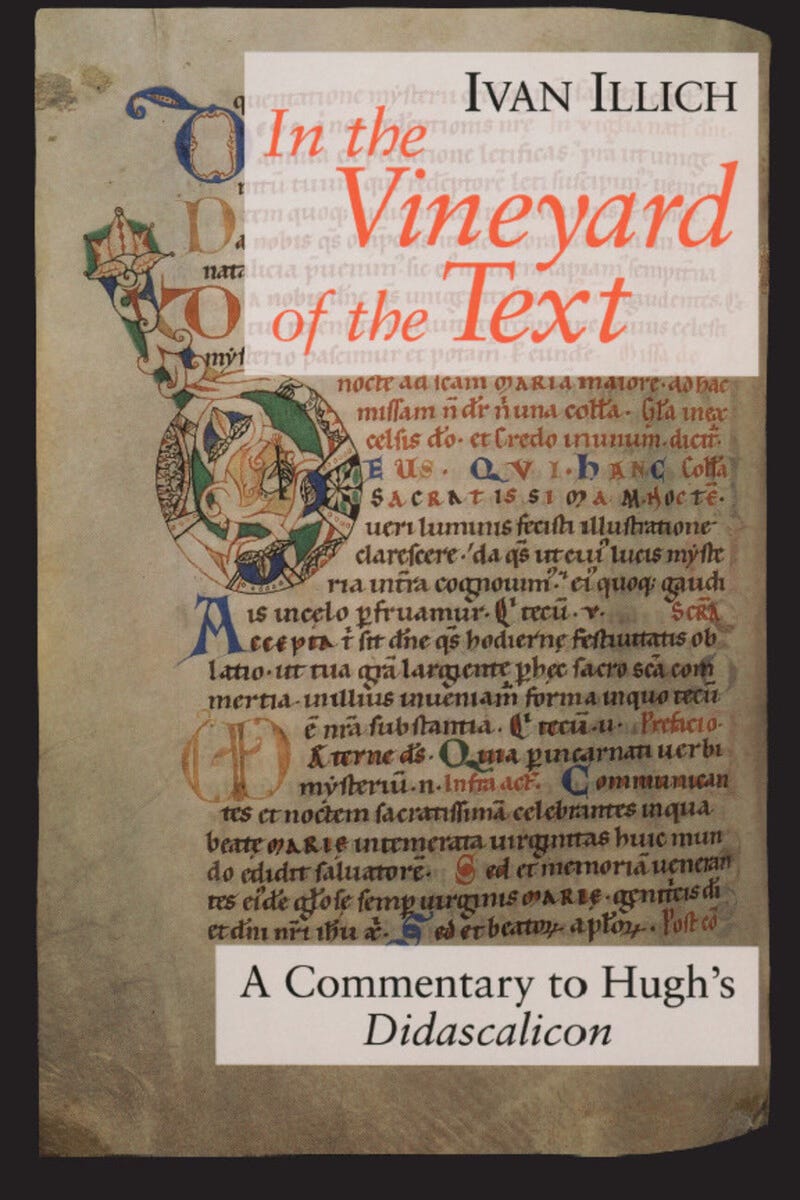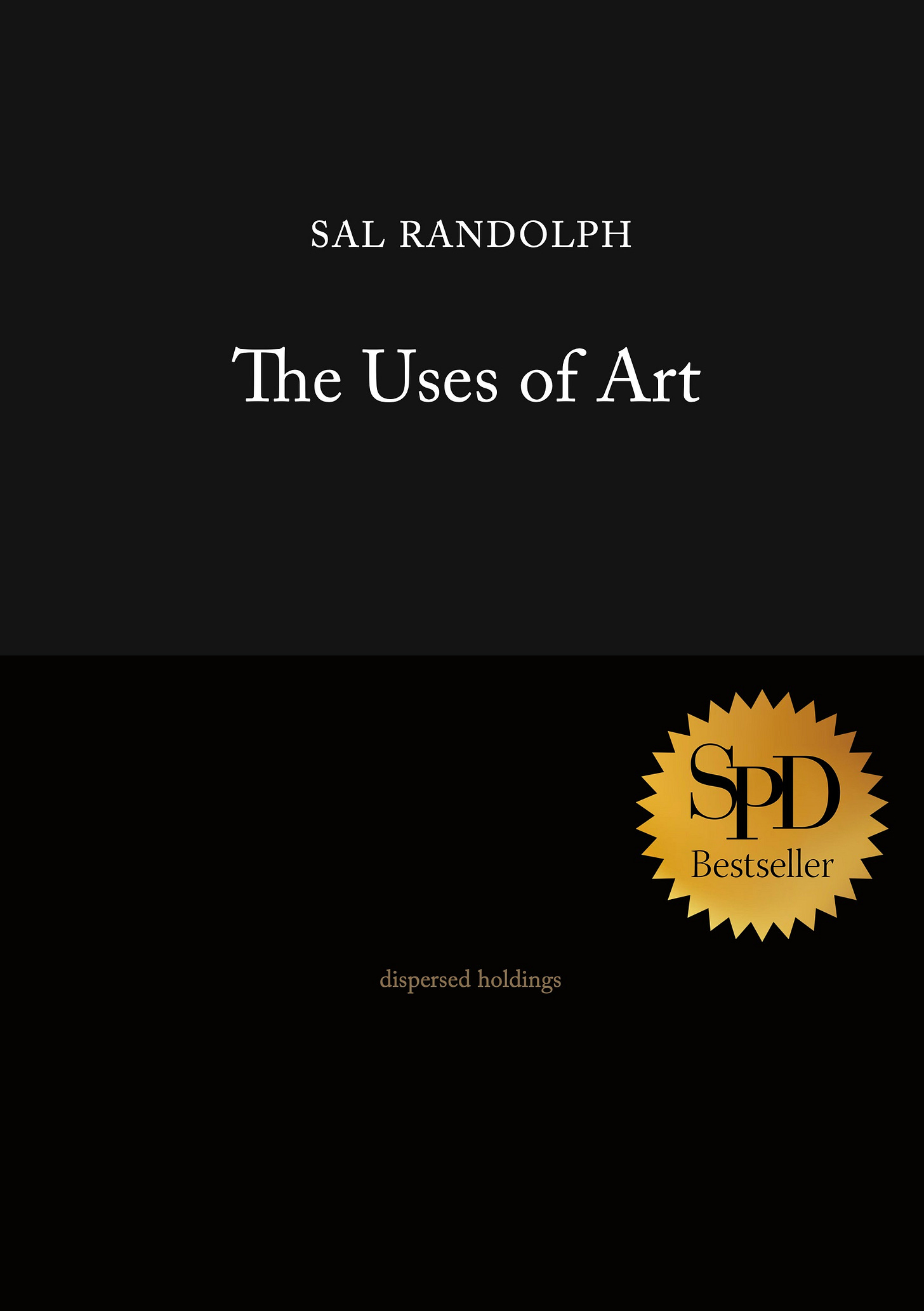Artificial Attention?
A letter to my friend Jac Mullen on AI and attention.

Dear Friends,
I’ve been having a conversation in my head with my friend . Jac’s Substack, After Literacy, explores a future which is rapidly becoming our now, one in which reading (in the way that I’ve thought of it and experienced it) is no longer central to the lives of many people, especially young people. The rise of AI is part of what he’s thinking through, but the questions he raises are at once broader and more specific than any one technology.
I was delighted when Jac recently started his Substack. Jac is one of the deepest and most original thinkers I know. He was a founding editor of a journal, The American Reader, where parts of my book (The Uses of Art) first appeared. There was a time when I got to have dinner with Jac pretty much every week — I was having a crisis; he was the best possible listener and adviser. We’ve also looked lots of art together and had long conversations about the nature of attention.
One of Jac’s most provocative ideas is that we’re better off dropping the term “artificial intelligence,” and instead calling these new technologies “artificial attention.” What could this mean for how we approach our present and future?
I’m taking up his open invitation to think and feel through some of these questions.
— Sal
Dear Jac,
I am immediately engaged by your assertion that we would more accurately rename Artificial Intelligence as “Artificial Attention.” The idea sends my mind in a million directions. I want to agree and argue at the same time. Which is to say there is an intuitive rightness to the idea, and it also causes alarm throughout my own networks of affection and allegiance.
Turning the idea over this afternoon, I saw that there were many ways in which we (we humans, this society) outsource our attention, or extend it through the bodies and minds of others. All forms of curation and gate-keeping could be said to be a kind of outsourcing of attention. We regularly expect publications of various kinds to turn up interesting or salient things for us. Newspapers are built on this, as are magazines, but also many books.
Which is to say that writing (the way you are talking about it) isn’t only outsourced memory, it is also reified attention. Attention of the past (sometimes the very recent past, as in the attention of a journalist) is made solid and referenceable by the act of publishing.
If salient or interesting things are rare in the great rush of information and experience, then it is quite natural to hope that others are also hunting for them (gathering them? panning for them?) and that these others will share their finds. We value great curators and brilliant editors. We also value writers who do the (sometimes dull) work of research and bring back only the most vividly intriguing treasures.
This goes way back. Ancient memory systems, like the record-keeping of cuneiform, also encode a sense of what is important. How we remember is closely linked to what we remember. In their bureaucratic limitations (or specificity), early marks and scripts were selective in what they concerned themselves with, recording primarily what was critical for taxation and state control. In other words, a marking-system like the earliest clay tokens, or a language-system like cuneiform may look like artificial memory, but even at writing’s origins, some degree of artificial attention was already built in.
How We Notice, What We Notice
One thing you’ve got me thinking about is the syntax and semantics of attention. Let’s say the syntax is how we pay attention—all the experiences of concentration, contemplation, reverie, distraction and interruption that are part of our daily life. Is my attention deep and effortless, as in flow? Does it move instantly towards something that catches our eye (right now, for me, a flight of pigeons, criss-crossing the sky), or an unexpected bang or bark? Does it require effortful pressure to return my eye and mind to what I am reading or writing? Or does it weave easily between senses and thoughts, tasks and digressions, memory and imagination?
The semantics, then, would be what we pay attention to. In particular I’m thinking of whatever someone finds naturally interesting (salient, as you say).
In one recent essay, you make a useful distinction between the familiar forms of consciously directed attention (spotlight attention or “selective attention”) and the subtle, unconscious pre-processing which determines what it is we are interested in (“predictive attention”). We don’t have direct access to our own preprocessing, which makes it tantalizing and open to speculation (as well as scientific investigation).
Your suggestion is that large language models and their kin are working in this unconscious area, “externaliz[ing] an ephemeral, inner activity into something programmable, persistent, and shareable.” It’s made me wonder how it is that we ordinarily access and train our unconscious attention. How do we form our sense of what to notice?
Education is one way: we each spend years in classrooms where teachers try to give us a new sense of what to care about (and for those who don’t know Jac, he is one of those teachers).
Another way we do this is socially, developing our sense of what is important in collaboration with those around us. I’m thinking of teens here, and what was like to suddenly see the world through our friends’ eyes and desires.
Of course this also continues throughout our lives. Is it this social salience which has been altered (dominated, hacked) by social media and its attendant algorithms? I think so. Are the social personae of artificial assistants another way we are being unconsciously hacked?
Religions and spiritual paths are another way to re-orient our sense of what is important. Conscious practices of attention are as well. I imagine there are many I have not yet thought of. Taking in your speculations, Jac, I feel the urgency of understanding more of our own history, and of our pre-digital technologies of experience. For me, reading itself is a central one.
In the Vineyard
Your essays sent me back to Ivan Illich and his book, In the Vineyard of the Text. I’m loving both the sparks going off in his mind, and the sparks that go off in mine as I read. This sense of discovery—his discovery, my discovery, our collaboration (even though he is no longer among the living)—is the great pleasure of reading, of study, of thinking.
Illich (following the trail of Hugh of St. Victor) traces the time in medieval Europe when monastics shifted from using written words as a score for reading aloud and discovered the possibilities of silent reading. Reading, which had been a collective activity, more like singing, became something personal, intimate, interior.
If earlier forms of reading saw the alphabet as a score, these later forms treated the text as a place of pilgrimage. You could leave the home of the self, enter the text, and travel through it, gathering sights and sounds, moments of insight and wisdom. This gathering is something I personally delight in, something I experienced just now in reading Illich’s book.
Why do we care about this change that he maps, which took place in the twelfth century? It’s a reminder that what we mean by reading (and thinking) is contingent on specific times and places, with particular practices, rituals, and forms of education. I think this is what you’re pointing to about mass literacy, which we’ve come to take for granted. Society could be otherwise, and may already be otherwise.
What sent me back to Illich was the desire to reconnect with reading as a sacred act. I wanted to look into that past to consider how we might create new practices for our future, practices that honor what you call soul-craft.
This is just a beginning, but I’ll stop here for now.
With love, Sal
Ivan Illich, from In the Vineyard of the Text
Bookish reading can now clearly be recognized as an epochal phenomenon and not as a logically necessary step in the progress toward the rational use of the alphabet; as one mode of interaction with the written page among several; as a particular vocation among many, to be cultivated by some, leaving other modes to others. The coexistence of distinct styles of reading would be nothing new. To make this point, I want to tell the story of reading during a distant past century of transition. With George Steiner I dream that outside the educational system which has assumed entirely different functions there might be something like houses of reading, not unlike the Jewish shul, the Islamic medersa, or the monastery, where the few who discover their passion for a life centered on reading would find the necessary guidance, silence, and complicity of disciplined companionship needed for the long initiation into one or the other of several "spiritualities" or styles of celebrating the book. In order that a new asceticism of reading may come to flower, we must first recognize that the bookish "classical" reading of the last 450 years is only one among several ways of using alphabetic techniques.
—
Hugh [of St. Victor] directs his reader to a foreign land. But he does not ask him to leave his family and accustomed landscape to move on the road from place to place toward Jerusalem or Santiago. Rather he demands that he exile himself to start on a pilgrimage that leads through the pages of a book. He speaks of the Ultimate which should attract the pilgrim, not as the celestial city for pilgrims of the staff, but as the form of Supreme Goodness which motivates the pilgrims of the pen. He points out that on this road the reader is on his way into the light which will reveal his own self to him.
—
When Hugh reads, he harvests; he picks the berries from the lines. He knows that Pliny had already noted that the word pagina, page, can refer to rows of vines joined together. The lines on the page were the thread of a trellis which supports the vines. As he picks the fruit from the leaves of parchment, the voces paginarum drop from his mouth; as a subdued murmur, if they are meant for his own ears, or recto tono, if he addresses the community of monks. There is an expression which allows us to distinguish the two kinds of activity: sibi legere, which means "reading to oneself," in contrast to clara lectio, meant for the ears of others.
—
The root of the English word "to read" connotes "to give advice," "to make out," "to peruse and interpret." The Latin legere comes from a physical activity. Legere connotes "picking," "bundling," "harvesting" or "collecting." The Latin word for the branches and twigs that are collected is derived from legere. These sticks are called lignum, which contrasts with materia somewhat as firewood can be distinguished from timber. The German "to read" (lesen) still clearly conveys the idea of gathering beech sticks (the word for "letter" is equivalent to sticks of beechwood, reminding us of the runes used in magical incantations).
For Hugh, who uses Latin, the act of reading with the eyes implies an activity not unlike a search for firewood.
[emphases mine]
from Jac Mullen’s After Literacy
Ivan Illich
Ivan Illich’s In the Vineyard of the Text is available from Equinox Publishing.
Tell me, how are you thinking these days about artificial intelligence, or artificial attention?
Further adventures and new ways of seeing can be found in my book, The Uses of Art.
Artist Sal Randolph’s THE USES OF ART is a memoir of transformative encounters with works of art, inviting readers into new methods of looking that are both liberating and emboldening.
Dazzlingly original, ferociously intelligent.
— Michael Cunningham
A joyful, dazzling treasure-box of a book.
— Bonnie Friedman
Here’s a guide, to waking up, over and over again.
— Roshi Pat Enkyo O’Hara






Thank you for this! So fruitful for the weavings of so many threads. I ask then, is artificial reminiscent of the trickster, the creator of artifice? and as such the pointer to random, new and different directions... or attentions? Loved Illich's "pilgrims of the pen"!
I recently wrote something about the shift to silent reading (was thinking about Augustine’s sense of shock at seeing his mentor Ambrose reading silently), but didn’t know about the Illich book. Will seek that out, thank you! It’s interesting, for me, to think about what a social shift that must have been, for people who read, to suddenly see others internalize it, and retreat so clearly to an inner world, with their text. So many things were gained! But what was lost?